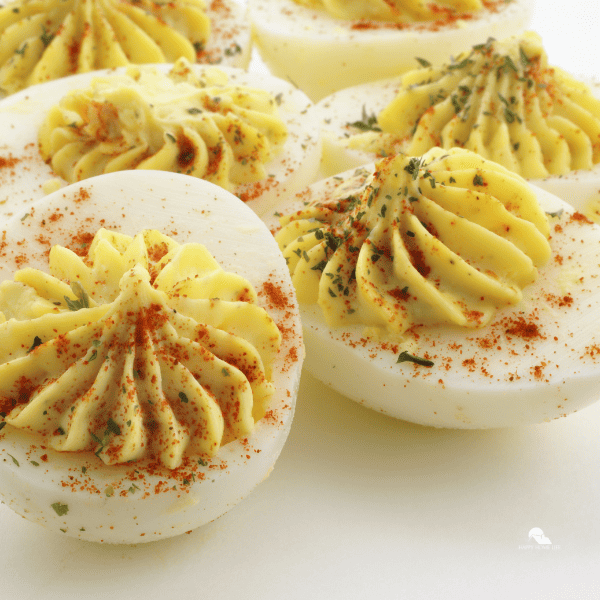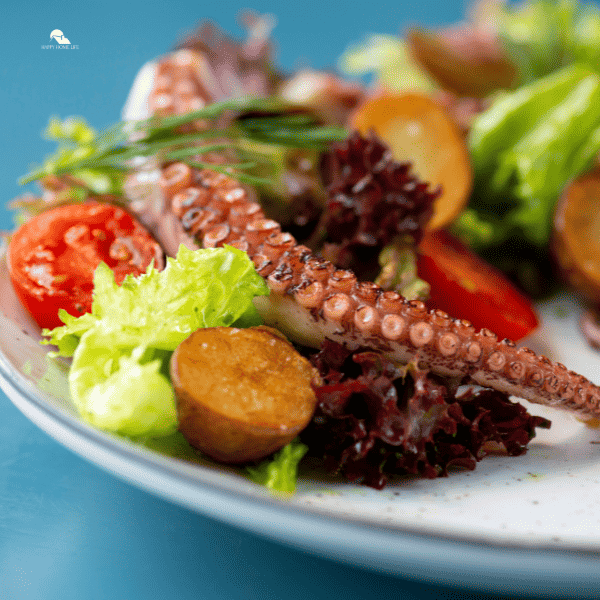When it comes to preparing for gatherings, picnics, or just having a delicious snack ready in your fridge, deviled eggs are often a go-to choice. However, one common question that arises after making a batch is, how long will deviled eggs stay good in the refrigerator?
Deviled eggs, a popular and beloved appetizer known for their creamy filling and delightful taste, are a staple at gatherings, picnics, and holiday feasts. However, understanding the shelf life of these delicious treats in your fridge is crucial to ensuring they remain safe to eat and retain their flavor.
You might enjoy these posts:
- How Long Can You Leave Boiled Eggs Out of The Refrigerator
- If Meat Turns Brown In The Fridge Is It Bad?
- How Long Does Fish Last in the Fridge?
Whether you’re a seasoned chef or a culinary novice eager to perfect your deviled egg recipe, knowing how long deviled eggs stay good in the refrigerator is essential for food safety and enjoyment. So, let’s embark on this exploratory journey to ensure your deviled eggs are always fresh and ready to impress.

How long can deviled eggs stay good in the refrigerator?
Deviled eggs can stay good in the refrigerator for up to 2-3 days. It’s important to store them properly to maintain their freshness. The refrigerator temperature should be below 40°F (4°C) to prevent bacterial growth. When refrigerating deviled eggs, it’s best to place them in an airtight container to keep them fresh and protect them from absorbing any odors from other foods in the fridge.
It’s also recommended to avoid adding any garnishes, such as paprika or fresh herbs, until just before serving, as they can cause the eggs to spoil more quickly. Enjoy your deviled eggs within the recommended time frame to ensure they’re safe and delicious.
Why Can’t Deviled Eggs Stay Fresh Longer?
Ingredients Are Perishable
The primary reason deviled eggs cannot stay fresh for an extended period is that the ingredients used are perishable. Mayonnaise, a common ingredient in the yolk mixture, can spoil quickly if not kept at the correct temperature.
Risk of Bacterial Growth
Eggs, in general, are susceptible to bacterial growth, especially salmonella, which can thrive at room temperature. Keeping deviled eggs refrigerated minimizes this risk, but over time, even refrigeration can’t stop bacteria from eventually growing.

How Can I Tell If My Deviled Eggs Have Gone Bad?
When deviled eggs spoil, there are clear signs that indicate they are no longer safe to consume. Some common signs of spoilage in deviled eggs include an off-putting odor, changes in texture or appearance, and the presence of mold. If the deviled eggs have a sour or rancid smell, it is best to discard them immediately.
Any sliminess, discoloration, or unusual texture on the surface of the eggs is also a sign of spoilage. Also, if you notice any greenish or black spots or the presence of mold, it is crucial to throw the deviled eggs away to avoid foodborne illness. Always trust your senses and err on the side of caution when it comes to consuming deviled eggs.
Unpleasant Smell
One of the first signs that your deviled eggs have spoiled is an unpleasant smell. Fresh deviled eggs should not have a strong or off-putting odor.
Change in Texture
Another sign to look out for is a change in texture. If the filling starts to become excessively watery or if the whites become rubbery, it’s time to toss them.
Visible Mold
While it’s less common, visible mold can also develop on deviled eggs that have been left in the fridge for too long. If you notice any green or black spots, do not consume the eggs.
Ways to Extend the Shelf Life of Deviled Eggs
To extend the shelf life of deviled eggs, there are a few strategies you can employ. First, store them in an airtight container in the refrigerator. This will help prevent any odors or flavors from seeping into the eggs. Also, you can try placing a damp paper towel or a slice of bread in the container with the deviled eggs to help maintain their moisture. Another option is to keep the filling and the egg whites separate until you are ready to serve, and then assemble them right before serving. This will help prevent the filling from making the egg whites soggy. By following these tips, you can enjoy your deviled eggs for an extended period without compromising their taste and texture.

Tips for maintaining the freshness of deviled eggs
To maintain the freshness of deviled eggs, it is important to follow some simple tips. First, refrigerate the deviled eggs promptly after making them. Keeping them at a cool temperature will help prevent bacterial growth. Secondly, store the deviled eggs in an airtight container to protect them from absorbing any odors or flavors from other foods in the refrigerator.
Also, consider placing a damp paper towel or a slice of bread in the container to maintain the moisture of the deviled eggs. Lastly, consume the deviled eggs within 3-4 days of preparation to ensure the best flavor and quality.
Deviled Egg Safety Tips
When it comes to preparing and storing deviled eggs, it’s important to follow some food safety measures to ensure their freshness and avoid any risks of foodborne illnesses. Here are some deviled egg safety tips to keep in mind:
- Store them properly: Keep deviled eggs refrigerated at all times, especially if they contain mayonnaise or other perishable ingredients.
- Use clean utensils: Make sure to use clean utensils and equipment when preparing deviled eggs to prevent cross-contamination.
- Avoid leaving them at room temperature: Deviled eggs should not be left out at room temperature for more than two hours, as bacteria can multiply rapidly.
- Consume them within a few days: It’s best to consume deviled eggs within 2-3 days of preparation to ensure their freshness.
- Be cautious with raw eggs: When making the filling, use pasteurized eggs or thoroughly cook the eggs before using them to eliminate the risk of salmonella.
By following these deviled egg safety tips, you can enjoy this delicious treat without compromising your health.
Food safety measures when preparing and storing deviled eggs
When it comes to preparing and storing deviled eggs, it’s important to prioritize food safety to prevent any potential risks of foodborne illnesses. Here are some essential food safety measures to follow:
- Use clean utensils and equipment: Always ensure that your utensils and equipment are properly cleaned and sanitized before use to avoid cross-contamination.
- Refrigerate promptly: Deviled eggs should be refrigerated as soon as possible, especially if they contain perishable ingredients like mayonnaise. Leaving them out at room temperature for too long can lead to bacterial growth.
- Keep them at a safe temperature: Store deviled eggs in the refrigerator at or below 40°F (4°C) to maintain their freshness and prevent bacterial growth.
- Consume within a few days: It’s recommended to consume deviled eggs within 2-3 days of preparation to ensure their freshness. Discard any leftovers beyond this timeframe.
You can enjoy delicious and safe deviled eggs by following these food safety measures.

Common mistakes to avoid when making deviled eggs
When making deviled eggs, it’s important to avoid common mistakes that can affect the taste and safety of the dish. Here are some key mistakes to steer clear of:
- Overcooking the eggs: Overcooking can lead to rubbery yolks and make it difficult to achieve a smooth filling. Follow the recommended cooking time and immediately cool the eggs to prevent overcooking.
- Incorrect yolk-to-mayo ratio: Using too much mayonnaise can make the filling overly runny, while using too little can result in a dry texture. Find the right balance for a creamy and flavorful filling.
- Ignoring proper seasoning: Seasoning adds depth of flavor to deviled eggs. Don’t forget to include salt, pepper, and other spices to enhance the taste.
- Not piping the filling: Using a piping bag or zip-top bag with a corner snipped off allows for a neat and visually appealing presentation. Avoid simply spooning the filling, as it can look messy.
By avoiding these common mistakes, you can ensure that your deviled eggs turn out delicious and visually appealing.
Conclusion
In conclusion, deviled eggs are a versatile and delicious dish that can be enjoyed as an appetizer, side dish, or even a main course. When it comes to storing deviled eggs, it’s important to follow proper refrigeration guidelines and use the right containers to maintain their freshness and prevent spoilage. By applying food safety measures and avoiding common mistakes, you can enjoy deviled eggs that are not only tasty but also safe to eat. So go ahead and whip up a batch of these delectable treats, and don’t forget to try out some of the mouth-watering deviled egg recipes we’ve provided for a truly delightful experience.







